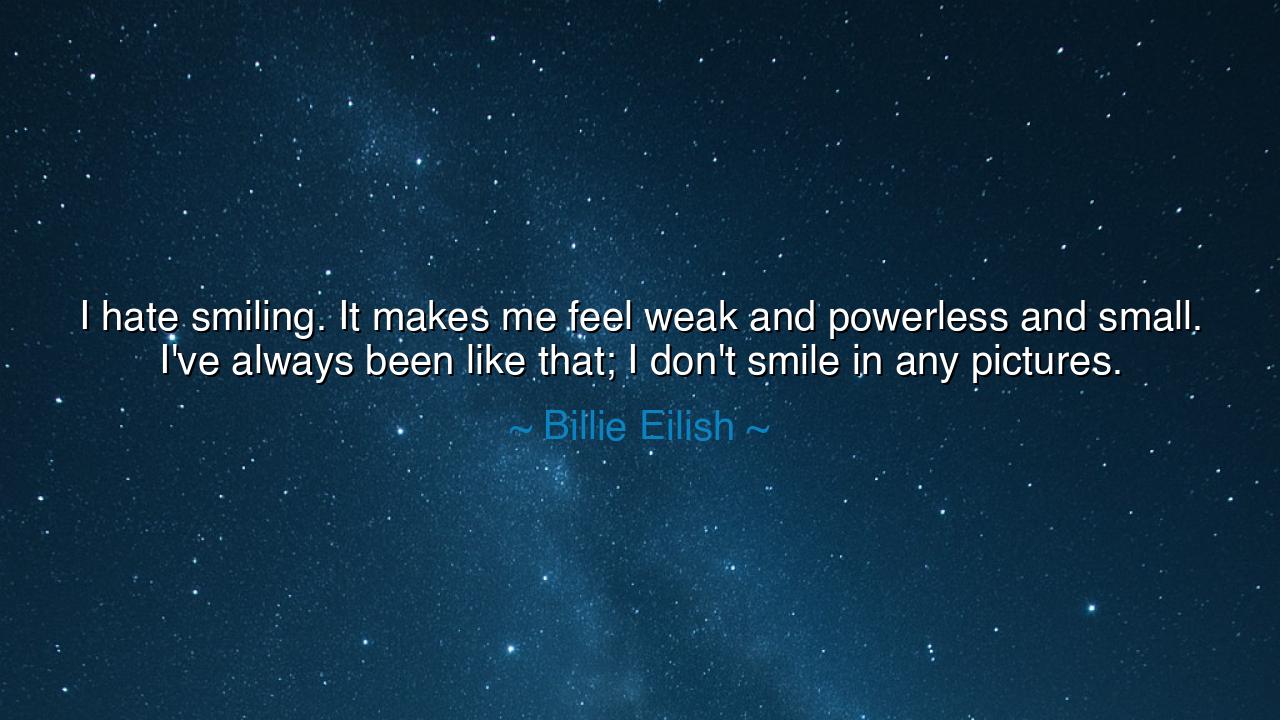
I hate smiling. It makes me feel weak and powerless and small.
I hate smiling. It makes me feel weak and powerless and small. I've always been like that; I don't smile in any pictures.






Hear the voice of Billie Eilish, young yet ancient in spirit, who confessed with striking honesty: “I hate smiling. It makes me feel weak and powerless and small. I’ve always been like that; I don’t smile in any pictures.” These words, sharp and unadorned, speak not of vanity nor rebellion alone, but of a soul that refuses to let others dictate the terms of its expression. For in her rejection of the conventional smile, she unveils the hidden struggle between authenticity and expectation, between the face we show the world and the truth that dwells within.
For what is the smile in the eyes of society? It is often demanded, especially of the young, especially of women—an emblem of obedience, of sweetness, of conformity to another’s comfort. Yet a smile that is forced becomes not a gift but a mask, stripping the one who wears it of their power. Billie’s refusal to smile is thus an act of defiance, a declaration that her worth does not lie in pleasing the gaze of others, but in being true to herself. This is not hatred of joy, but hatred of falsehood.
The ancients, too, warned against masks. The Stoic philosophers taught that one must live in harmony with one’s true nature, not play-act for the approval of the crowd. The Romans admired the gravitas of leaders who bore a solemn face, for such bearing signaled seriousness and strength. In this way, Billie’s rejection of the smile is not new, but echoes the wisdom of those who believed that dignity often lies in restraint, in refusing to feign what one does not feel.
Consider the tale of Queen Elizabeth I of England. Painted and dressed to display majesty, she often chose a stern expression in portraits, not a smile. To her, the absence of a smile conveyed authority and power, for she ruled a kingdom in tumult and wished to be seen not as fragile or submissive, but as a monarch of iron will. Like Billie, she understood that the smile, while soft and warm, could also diminish the aura of command. Thus, history itself shows that even the withholding of a smile may be a statement of sovereignty.
Yet, we must not misunderstand. To smile is not weakness in itself, nor is solemnity always strength. Rather, the lesson lies in freedom—the freedom to choose how one expresses oneself, without compulsion. A true smile is a flame of joy, but a forced one is a chain. Billie’s words teach us that power lies in refusing the chains, in preserving the integrity of one’s face, one’s spirit, one’s truth.
Her words also call us to compassion. For there are those who see another’s lack of a smile and judge them harshly, thinking them cold, bitter, or joyless. But the wise do not judge by appearances. They understand that the face may guard the heart, and that strength may dwell in solemn silence as much as in laughter. To recognize this is to honor the many ways in which humanity expresses itself, not confining it to a single mold.
Therefore, O listener, take this teaching into your life: let not the world demand from you a false face. Smile when you are moved to joy, and let your joy be true. But when your spirit resists, do not betray it for the comfort of others. Your worth lies not in appearances, nor in pleasing the gaze of the crowd, but in the strength of your authenticity. In this way, you will stand as Billie stands—not weak, but powerful, not small, but sovereign over your own soul.
Thus her words, though they may sound defiant, resound as ancient wisdom: that the truest strength is to live without masks. A smile forced is no gift, but a prison; a smile chosen is a crown. Carry this truth with you, and you will never be powerless, for you will always belong to yourself.






AAdministratorAdministrator
Welcome, honored guests. Please leave a comment, we will respond soon